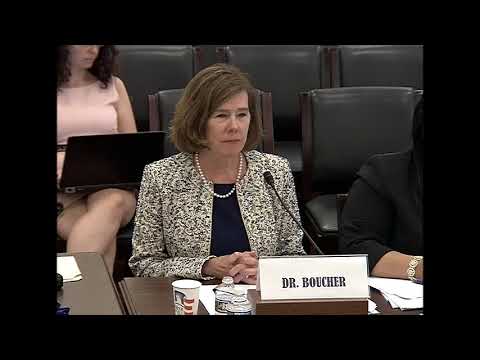bioterrorism
See the following -
Experts Warn Of Antimicrobial Resistance, Additional Threats To National Biosecurity
 Dr. Asha George...was among a panel of experts testifying about the state of U.S. preparedness for biological attacks and infectious disease pandemics. The experts agreed that a range of factors affect our country's ability to fight these threats, including weakened or fragmented federal oversight, limited incentives for research and development, and a lack of preparedness at the local level to protect vulnerable populations. "In short, the nation is not prepared for biological outbreaks, acts of bioterrorism, biological warfare of accidental releases with catastrophic consequences," George said. "We are talking about catastrophic events that affect the function of our entire society."
Dr. Asha George...was among a panel of experts testifying about the state of U.S. preparedness for biological attacks and infectious disease pandemics. The experts agreed that a range of factors affect our country's ability to fight these threats, including weakened or fragmented federal oversight, limited incentives for research and development, and a lack of preparedness at the local level to protect vulnerable populations. "In short, the nation is not prepared for biological outbreaks, acts of bioterrorism, biological warfare of accidental releases with catastrophic consequences," George said. "We are talking about catastrophic events that affect the function of our entire society."
- Login to post comments
10 Promising Technologies Assisting the Future of Medicine and Healthcare
Technology will not solve the problems that healthcare faces globally today. And the human touch alone is not enough any more, therefore a new balance is needed between using disruptive innovations but still keeping the human interaction between patients and caregivers. Here are 10 technologies and trends that could enable this...
- Login to post comments
A 'Very Graphic History' Of Germ Warfare
 Max Brooks, best-selling author of "World War Z" and non-resident fellow at the Modern War Institute at West Point, has partnered with the Blue Ribbon Study Panel on Biodefense to produce GERM WARFARE: A Very Graphic History. This highly stylized and engaging graphic novel, set for release this Saturday, depicts previous biological warfare events, the possibilities for the future, and the continued need for public health security. This is part of an effort by the bipartisan Panel to educate the public about biological risks and why a strong biodefense enterprise is critical to the health and security of the Nation.
Max Brooks, best-selling author of "World War Z" and non-resident fellow at the Modern War Institute at West Point, has partnered with the Blue Ribbon Study Panel on Biodefense to produce GERM WARFARE: A Very Graphic History. This highly stylized and engaging graphic novel, set for release this Saturday, depicts previous biological warfare events, the possibilities for the future, and the continued need for public health security. This is part of an effort by the bipartisan Panel to educate the public about biological risks and why a strong biodefense enterprise is critical to the health and security of the Nation.
- Login to post comments
Accelerating Identification and Tracking of Pandemic Disease Outbreaks
 A national biosurveillance program requires the collaboration of multiple federal, state and local agencies to provide a comprehensive view of a health-related event. Bitscopic's Praedico™ biosurveillance platform breaks down the data barriers among organizations with an extensible architecture that can incorporate any kind of data. The platform also delivers high performance by incorporating the latest technologies such as big data, NoSQL databases, and machine learning. Read More »
A national biosurveillance program requires the collaboration of multiple federal, state and local agencies to provide a comprehensive view of a health-related event. Bitscopic's Praedico™ biosurveillance platform breaks down the data barriers among organizations with an extensible architecture that can incorporate any kind of data. The platform also delivers high performance by incorporating the latest technologies such as big data, NoSQL databases, and machine learning. Read More »
- Login to post comments
Biodefense Takes Center Stage at House Oversight Hearing
 Is the nation ready to defend against antibiotic-resistant diseases or bioterrorism? What would the response to a biological attack or disease pandemic look like? Those threats and the collaboration of private, federal and local agencies to respond to them were the focus of a hearing Wednesday in the House Oversight Subcommittee on National Security on biodefense preparedness. Congressman Stephen Lynch, D-Mass., said at the beginning of the hearing that around 2.4 million people could die in high-income countries between 2015 and 2050 without an effort to contain antimicrobial resistance, according to an April report to the Secretary-General of the United Nations.
Is the nation ready to defend against antibiotic-resistant diseases or bioterrorism? What would the response to a biological attack or disease pandemic look like? Those threats and the collaboration of private, federal and local agencies to respond to them were the focus of a hearing Wednesday in the House Oversight Subcommittee on National Security on biodefense preparedness. Congressman Stephen Lynch, D-Mass., said at the beginning of the hearing that around 2.4 million people could die in high-income countries between 2015 and 2050 without an effort to contain antimicrobial resistance, according to an April report to the Secretary-General of the United Nations.
- Login to post comments
Bioterrorism Fear Led Scientists To Withhold Botulinum Toxin Info
Researchers have uncovered a new breed of Botulinum toxin, however, they are withholding certain information about the neurotoxin out of concern it could be misused by individuals seeking to develop a biological weapon, National Public Radio reported on Wednesday. Read More »
- Login to post comments
Cities Might Not Be As Prepared As They Think For A Bioterrorism Attack
Imagine that a small group of terrorists deliberately infect themselves with smallpox and then walk around London, spreading it to the populace. How much could the terrible disease proliferate before the world realized something was amiss? Read More »
- Login to post comments
Congress Passes Legislation Authorizing Critical Biodefense Programs
 The House yesterday passed the Pandemic and All-Hazards Preparedness and Advancing Innovation Act. The bill reauthorizes existing statute governing public health efforts at the Department of Health and Human Services. Additions made by the bill - some of which were recommended by the Blue Ribbon Study Panel on Biodefense - address biodetection, hospital preparedness, medical countermeasures and response. Many of these programs will enable HHS to better defend the nation against biological threats. Both chambers of Congress have passed the bill, and it will now go to President Trump for signature.
The House yesterday passed the Pandemic and All-Hazards Preparedness and Advancing Innovation Act. The bill reauthorizes existing statute governing public health efforts at the Department of Health and Human Services. Additions made by the bill - some of which were recommended by the Blue Ribbon Study Panel on Biodefense - address biodetection, hospital preparedness, medical countermeasures and response. Many of these programs will enable HHS to better defend the nation against biological threats. Both chambers of Congress have passed the bill, and it will now go to President Trump for signature.
- Login to post comments
Developer Of Sensitive Devices To Detect Diseases, Proteins Gets In-Q-Tel Funding
Biotech firm Quanterix raised $18.5 million in a funding round joined by CIA venture capital wing In-Q-Tel, the company announced. Read More »
- Login to post comments
Ebola In West Africa Is A Wake-Up Call
Eight months into the world's worst Ebola outbreak, we have lost 5,000 lives and expect to see more infections and deaths in the coming months. The reason is simple: We have no drug to cure Ebola, or vaccine to prevent it...
- Login to post comments
Experts support a future Manhattan Project for Biodefense to thwart new threats
 An effort similar to the Manhattan Project - in which American-led R&D produced the first nuclear weapons during World War II - is needed now in defense against the growing global threats posed by infectious diseases and bioterrorism, sources said Thursday during a Blue Ribbon Study Panel on Biodefense meeting...witness panelists and attendees at the panel's first public meeting held yesterday in New York City discussed "A Manhattan Project for Biodefense: Taking Biological Threats Off the Table," a proposed national, public-private research and development undertaking that would defend the United States against biological threats.
An effort similar to the Manhattan Project - in which American-led R&D produced the first nuclear weapons during World War II - is needed now in defense against the growing global threats posed by infectious diseases and bioterrorism, sources said Thursday during a Blue Ribbon Study Panel on Biodefense meeting...witness panelists and attendees at the panel's first public meeting held yesterday in New York City discussed "A Manhattan Project for Biodefense: Taking Biological Threats Off the Table," a proposed national, public-private research and development undertaking that would defend the United States against biological threats.
- Login to post comments
Found: Forgotten Vials Of Smallpox
Headline-making news today from the Centers for Disease Control and Prevention: Workers clearing out an old storage room on the Bethesda, Md. campus of the National Institutes of Health have found a forgotten box of vials that contain smallpox...
- Login to post comments
Grant Supports Development Of Software To Judge Quality Of Electronic Public Health Data
 With the growing need for early identification of emerging threats including those of bioterrorism, pandemic flu, Ebola and foodborne illnesses, public health departments nationwide are increasingly relying upon data captured from electronic sources. A $381,000, 2-year grant from the National Library of Medicine at the National Institutes of Health supports development by the Regenstrief Institute and the Indiana University Richard M. Fairbanks School of Public Health of open source software tools to measure and monitor the quality of electronic data being transmitted to public health departments across the nation from health care systems, medical laboratories, physician offices and other sources.
With the growing need for early identification of emerging threats including those of bioterrorism, pandemic flu, Ebola and foodborne illnesses, public health departments nationwide are increasingly relying upon data captured from electronic sources. A $381,000, 2-year grant from the National Library of Medicine at the National Institutes of Health supports development by the Regenstrief Institute and the Indiana University Richard M. Fairbanks School of Public Health of open source software tools to measure and monitor the quality of electronic data being transmitted to public health departments across the nation from health care systems, medical laboratories, physician offices and other sources.
- Login to post comments
HIMSS19: Open Source Software for Disaster Preparedness and Response
 Although not officially listed as a track at the HIMSS19 conference, there are a series of very important presentations on the use of open source software for disaster preparedness and response. This is a critical topic that we have covered extensively in Open Health News. As we detailed in this article, there was a major failure in being able to provide victims of Hurricane Harvey, as well as Hurricane Irma and Hurricane Maria with access to their medical records. Few emergency medical responders could access their records either. The two success stories that came out of the hurricanes were two open source electronic health record (EHR) systems, OpenEMR and the VA's open source VistA EHR.
Although not officially listed as a track at the HIMSS19 conference, there are a series of very important presentations on the use of open source software for disaster preparedness and response. This is a critical topic that we have covered extensively in Open Health News. As we detailed in this article, there was a major failure in being able to provide victims of Hurricane Harvey, as well as Hurricane Irma and Hurricane Maria with access to their medical records. Few emergency medical responders could access their records either. The two success stories that came out of the hurricanes were two open source electronic health record (EHR) systems, OpenEMR and the VA's open source VistA EHR.
- The Future Is Open
- Login to post comments
Lawmakers Reaffirm Demand For Biowatch Data
The Homeland Security Department has turned over "substantial" documentation in response to a congressional panel's request for records on a controversial biological agent sensor network, but the Centers for Disease Control and Prevention has not been similarly forthcoming in providing related information, two Republican lawmakers said... Read More »
- Login to post comments